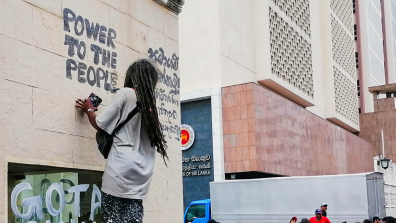A sweatshop worker tells her story
When she first started working, Arifa was a helper and earned only 100 taka a month. She has gradually worked her way up to sewing machine operator, and now earns 2200 taka a month, working an average of 13-14 hours per day. After 20 years as a garment worker Arifa earns more than Bangladesh's minimum wage, but still less than a living wage.
Arifa lives with her family near the factory. She is married and has three children: two sons and one daughter. Her eldest son works abroad in Saudi Arabia, and the other two children go to school. She thinks that her daughter, who is only four, will complete her education. Arifa?s husband, who has a small shop, supplements the family income, but he earns very little and his income is irregular.
Arifa?s family spends approximately 5000 taka on food, rent and health each month ? more than they earn. They also send money to their families. Arifa?s eldest son sends money home to the family, allowing them to make ends meet. She is very concerned about the unsafe conditions in her home, where she lives in a slum.
When Arifa finishes her grueling day at the factory, she comes home to do household chores and take care of her children, husband, grandparents and her husband?s parents. Although she tries to get him to help, her husband does not help with the housework.
Arifa believes that men dominate Bangladeshi society, but she believes fighting for women?s rights is so important. Being a member of the NGWF creates tension with her male relatives, as they expect her to go home once they have finished their work in the garment factories. The NGWF often holds meetings late in the evenings, when the workers have finished their shifts.
Arifa would like to leave her job. The work is exhausting and hard on her body, causing frequent pain, especially in the back. She works sitting down, but the chair provided is very unsupportive. However, through working in the garment sector, she feels 100% independent. She fights for women?s rights in the factory and at home. She is proud of her work and women?s rights participation.
Arifa does not feel safe in the factory - not because of sexual harassment, but because of security issues. She is scared of the building collapsing, the risk of fire and the poor working conditions: not enough light, no ventilation, dirty and unhygienic. She says she is not afraid of the owner because she is a strong woman, but because of the poor working conditions.



